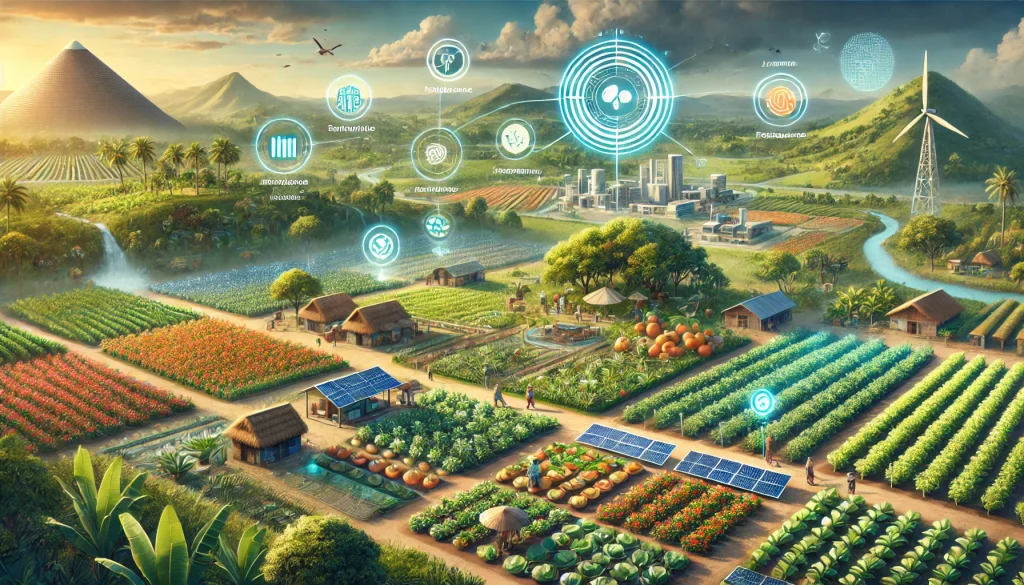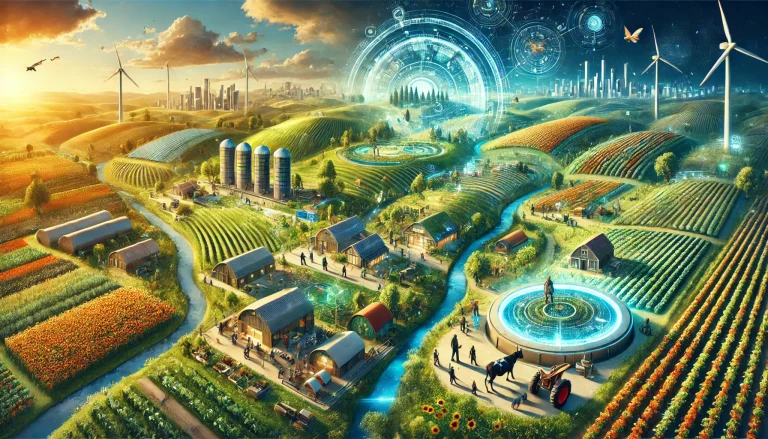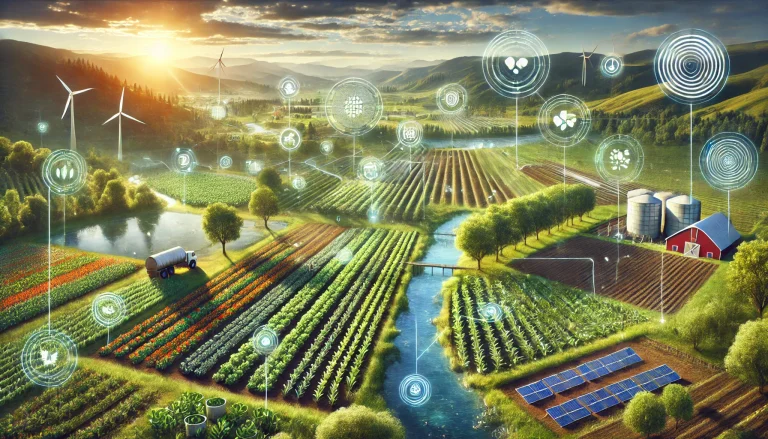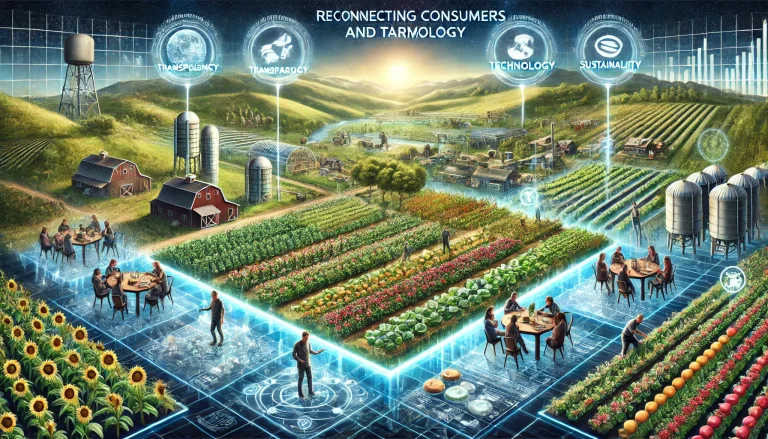Problem Statement:
Despite significant advances in agriculture, food insecurity remains a persistent and pervasive problem, especially in low-income countries. Smallholder farmers, who make up a large portion of the global agricultural workforce, often struggle to produce enough food to feed their families, let alone generate surplus crops for income. This issue is exacerbated by a variety of challenges, including the impacts of climate change, which disrupt growing seasons and reduce crop yields. Unpredictable weather patterns, increased frequency of extreme events, and shifting ecosystems make farming increasingly difficult for those who rely on traditional methods. Additionally, smallholder farmers frequently lack access to markets, making it difficult for them to sell their produce, gain fair prices, or invest in better farming inputs and techniques. This market isolation is further compounded by inadequate infrastructure, such as poor transportation networks, limited storage facilities, and insufficient access to agricultural services and technology. Without the necessary support, these farmers are trapped in a cycle of low productivity, limited income, and ongoing food insecurity. Addressing these challenges requires a multifaceted approach that enhances agricultural productivity, improves market access, and strengthens infrastructure, ultimately ensuring that smallholder farmers can sustainably feed their families and contribute to broader food security.
Pain Points:
- Low Agricultural Productivity: Smallholder farmers often lack the resources and technology to maximize crop yields.
- Climate Change Impacts: Unpredictable weather and extreme events disrupt farming practices and reduce crop yields.
- Lack of Market Access: Farmers struggle to sell their produce due to isolation from local and global markets.
- Inadequate Infrastructure: Poor roads, limited storage, and lack of access to services hinder agricultural productivity and marketability.
- Limited Financial Resources: Smallholder farmers often lack the capital needed to invest in improved seeds, fertilizers, and farming techniques.
- Post-Harvest Losses: Inadequate storage and transportation lead to significant losses after harvest, reducing the amount of food available.
- Soil Degradation: Over-farming and lack of access to sustainable practices contribute to soil fertility decline.
- High Input Costs: The cost of seeds, fertilizers, and other inputs can be prohibitive for smallholder farmers, limiting their ability to increase productivity.
- Lack of Agricultural Knowledge: Farmers often lack access to training and education on modern and sustainable farming practices.
- Vulnerability to Market Fluctuations: Farmers are exposed to price volatility, which can significantly impact their income and food security.
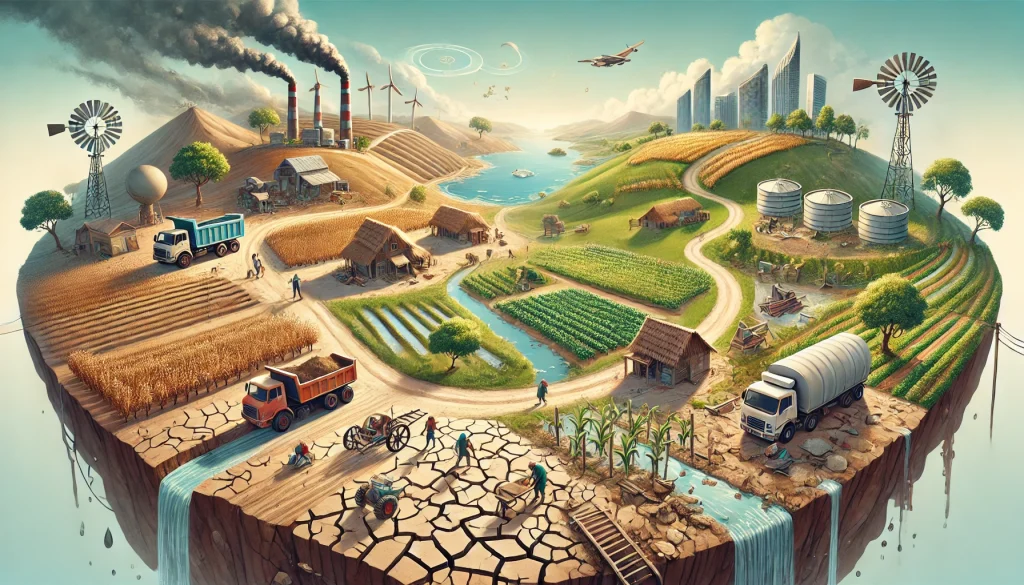
Future Vision:
The future of food security in low-income countries hinges on empowering smallholder farmers through sustainable agricultural practices, improved market access, and enhanced infrastructure. This vision includes the creation of a digital platform that addresses the multifaceted challenges faced by these farmers. The platform would offer tools and resources to improve agricultural productivity, such as access to high-quality seeds, fertilizers, and climate-resilient farming techniques. It would also provide real-time weather forecasts and climate adaptation strategies, helping farmers mitigate the effects of climate change. To improve market access, the platform would connect farmers with local and global markets, offering price transparency and direct sales channels to ensure fair compensation for their produce. Additionally, the platform would facilitate access to microfinance and investment opportunities, enabling farmers to invest in necessary inputs and infrastructure. By integrating transportation and logistics solutions, the platform would help reduce post-harvest losses and ensure that produce reaches markets in good condition. Partnerships with NGOs, government agencies, and private sector organizations would ensure that the platform provides comprehensive support, including education and training on sustainable practices, financial literacy, and business management. Ultimately, this platform would help break the cycle of food insecurity by empowering smallholder farmers to achieve greater productivity, income stability, and resilience against future challenges.
Use Cases:
- Access to Improved Inputs: Farmers use the platform to purchase high-quality seeds, fertilizers, and farming tools to enhance productivity.
- Climate-Resilient Farming: The platform provides real-time weather data and climate adaptation strategies to help farmers manage climate risks.
- Market Connectivity: Farmers connect directly with buyers, gaining access to local and global markets for fair pricing and increased sales.
- Microfinance and Investment Access: The platform offers microloans and investment opportunities to help farmers invest in necessary inputs and infrastructure.
- Transportation and Logistics Solutions: Farmers use the platform to arrange transportation and storage, reducing post-harvest losses.
- Education and Training: The platform provides educational resources on sustainable farming practices, financial literacy, and market trends.
- Soil Health Monitoring: Farmers access tools to monitor soil health and implement sustainable practices that maintain or improve soil fertility.
- Input Cost Management: The platform offers tools to compare prices and purchase inputs at the most affordable rates.
- Post-Harvest Management: Farmers receive guidance on reducing post-harvest losses through improved storage, processing, and packaging.
- Community Support and Networking: The platform fosters a community where farmers can share experiences, knowledge, and best practices.
Target Users and Stakeholders:
Target Users:
- Smallholder farmers in low-income countries seeking to improve productivity and market access.
- Agricultural cooperatives and organizations focused on supporting smallholder farmers.
- Agribusinesses interested in sourcing from smallholder farmers and promoting sustainable practices.
Stakeholders:
- Government agencies focused on agriculture, rural development, and food security.
- NGOs working on sustainable agriculture, climate resilience, and rural development.
- Technology companies developing digital platforms for agriculture and market access.
- Financial institutions offering microfinance and investment opportunities for smallholder farmers.
- Consumers interested in supporting sustainable and ethically produced food from smallholder farmers.
Key Competition:
- Farmers Business Network (FBN): Provides data-driven insights and tools to help farmers optimize their practices and connect with markets.
- AgFunder: An investment platform focused on agritech startups that support smallholder farmers and sustainable agriculture.
- One Acre Fund: Offers financing, training, and market access to smallholder farmers in Africa to improve productivity and income.
- Digital Green: Uses technology and community engagement to improve agricultural practices and market access for smallholder farmers.
- M-Farm: A mobile platform that connects Kenyan farmers to buyers and provides real-time market prices and agricultural information.
Products/Services:
- Input Access Platforms: Tools that help farmers purchase high-quality seeds, fertilizers, and farming equipment.
- Climate Adaptation Resources: Solutions that provide weather data and climate resilience strategies to mitigate farming risks.
- Market Access and Sales Channels: Digital platforms that connect farmers directly with buyers and markets, ensuring fair pricing.
- Microfinance and Investment Opportunities: Financial services that offer loans and investment options tailored to smallholder farmers.
- Transportation and Logistics Solutions: Tools for organizing transportation, storage, and logistics to reduce post-harvest losses.
- Educational and Training Resources: Content and programs focused on sustainable farming, financial literacy, and market trends.
- Soil Health Monitoring Tools: Technologies for assessing soil conditions and implementing sustainable practices.
- Input Cost Comparison Tools: Platforms that help farmers compare prices and manage the cost of agricultural inputs.
- Post-Harvest Management Solutions: Resources for improving storage, processing, and packaging to reduce post-harvest losses.
- Community Networking Platforms: Spaces for farmers to connect, share knowledge, and collaborate on best practices.
Active Startups:
- Apollo Agriculture: Provides financing, inputs, and advice to smallholder farmers through a mobile platform, helping them improve productivity and access markets.
- Twiga Foods: Connects smallholder farmers to urban markets through a mobile platform, improving food distribution and reducing waste.
- AgroCenta: A digital platform that provides smallholder farmers with market access, financing, and logistics support in Ghana.
- WeFarm: An online community for smallholder farmers to share knowledge, access information, and connect with markets.
- Pula: Offers agricultural insurance and digital solutions to smallholder farmers to protect them from climate risks and improve productivity.
Ongoing Work in Related Areas:
- Research on climate-resilient crop varieties and farming practices that help smallholder farmers adapt to changing weather patterns.
- Development of mobile-based platforms that provide real-time market prices, weather updates, and agricultural advice to farmers.
- Rural infrastructure improvement programs aimed at enhancing transportation, storage, and market access for smallholder farmers.
- Microfinance initiatives focused on providing smallholder farmers with access to affordable credit and investment opportunities.
- Education and training programs that teach smallholder farmers sustainable agricultural practices, financial literacy, and market engagement.
Recent Investment:
- $100 million investment in Twiga Foods in 2023 to scale their platform connecting smallholder farmers to urban markets in Africa.
- $75 million raised by Apollo Agriculture in 2022 to expand their services offering financing, inputs, and advice to smallholder farmers.
- $50 million in funding for AgroCenta in 2023 to enhance their digital platform providing market access and logistics support to farmers in Ghana.
- $35 million in venture capital for WeFarm in 2024 to grow their online community and knowledge-sharing platform for smallholder farmers.
- $25 million invested in Pula in 2023 to develop and distribute agricultural insurance and digital solutions for smallholder farmers.
Market Maturity:
The market for platforms and services supporting smallholder farmers in low-income countries is steadily maturing, driven by the urgent need to address food insecurity and improve agricultural productivity. The growing recognition of smallholder farmers as key players in global food security has led
to increased investment in digital platforms, market access solutions, and financial services tailored to their needs. Governments, NGOs, and the private sector are increasingly collaborating to provide the necessary support, infrastructure, and education to empower smallholder farmers. While challenges remain, particularly in reaching remote areas and addressing climate risks, the market is poised for continued growth. As more smallholder farmers gain access to the tools and resources they need, the agricultural sector will become more resilient, productive, and capable of ensuring food security for future generations.
Summary:
Food insecurity remains a persistent problem, particularly in low-income countries, where many smallholder farmers struggle to produce enough food to feed their families and generate income. This issue is exacerbated by challenges such as climate change, lack of market access, and inadequate infrastructure. To address these challenges, a digital platform that supports smallholder farmers by improving agricultural productivity, market access, and infrastructure is essential. By providing tools for climate adaptation, financial services, and market connectivity, the platform would help smallholder farmers break the cycle of food insecurity, achieve greater productivity, and contribute to global food security. As the market for these solutions continues to mature, driven by increased investment and collaboration, there is a significant opportunity to empower smallholder farmers and ensure a sustainable future for agriculture.
